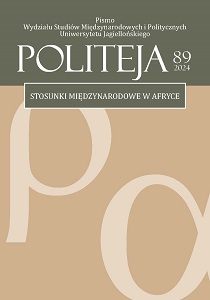Cele polityki zagranicznej Saharyjskiej Arabskiej Republiki Demokratycznej w kontekście uwarunkowań międzynarodowych w regionie Maghrebu
The Foreign Policy Objectives of the Sahrawi Arab Democratic Republic in the Context of International Conditions in the Maghreb Region
Author(s): Joanna MormulSubject(s): Politics, Political Theory, Government/Political systems, International relations/trade
Published by: KSIĘGARNIA AKADEMICKA Sp. z o.o.
Keywords: Sahrawi Arab Democratic Republic; foreign policy; unrecognised state; Morocco; POLISARIO Front;
Summary/Abstract: The Sahrawi Arab Democratic Republic (SADR), founded in February 1976 in the territory of the former Spanish Sahara, belongs today to the so-called unrecognised states category that do not meet all the criteria of the statehood. In the case of the SADR, it enjoys the recognition of several dozen UN members, as well as the most important international regional organisation on the continent – the African Union, however, the Sahrawi government controls only about 20% of the territory it claims rights for. Therefore, the axis of the SADR foreign policy is the constant struggle for international recognition, together with the attempts to exert indirect pressure on Morocco, which could persuade it to adopt the Sahrawi resolution to the protracted conflict over Western Sahara. Both of these goals seem increasingly distant, due to the events of the last three years: the Guerguerat crisis that ended the ceasefire between the POLISARIO Front and Moroccan forces, the decision of the administration of President Donald Trump to open a US consulate in the city of Dakhla in the Moroccan-controlled territory contested by the SADR, and the change in the position of the Spanish government – currently expressing support for the Moroccan plan for Western Sahara autonomy. The article is an attempt to analyse the foreign policy of an unrecognised state such as the Sahrawi Arab Democratic Republic in the context of international conditions in the region (in this case Maghreb), challenges it faces and the possibility of achieving its goals. The paper is largely based on qualitative data collected during field research over the years 2016-2023 conducted during study visits to Algeria and Spain.
Journal: Politeja - Pismo Wydziału Studiów Międzynarodowych i Politycznych Uniwersytetu Jagiellońskiego
- Issue Year: 21/2024
- Issue No: 89
- Page Range: 29-57
- Page Count: 29
- Language: Polish

